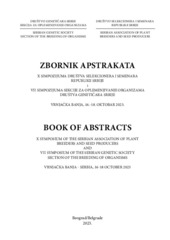Приказ основних података о документу
Skrining tolerantnosti na salinitet germplazme pšenice gajene na solonjecu
Salinity tolerance screening of wheat germplasm grown on solonetz
| dc.creator | Matković Stojšin, Mirela | |
| dc.creator | Petrović, Sofija | |
| dc.creator | Banjac, Borislav | |
| dc.creator | Jocković, Bojan | |
| dc.creator | Zečević, Veselinka | |
| dc.creator | Roljević Nikolić, Svetlana | |
| dc.creator | Knežević, Desimir | |
| dc.date.accessioned | 2023-10-27T11:40:02Z | |
| dc.date.available | 2023-10-27T11:40:02Z | |
| dc.date.issued | 2023 | |
| dc.identifier.isbn | 978-86-87109-17-9 | |
| dc.identifier.uri | http://RIVeC.institut-palanka.rs/handle/123456789/752 | |
| dc.description.abstract | Usled ljudskih aktivnosti, zaslanjenost zemljišta postaje glavni izazov za globalnu proizvodnju hrane. Pšenica je osnovna namirnica za veliki deo svetske populacije, a stres zaslanjenosti predstavlja značajnu pretnju njenoj produktivnosti. Stoga je stvaranje tolerantnih genotipova pšenice na salinitet od vitalnog značaja za obezbeđivanje održive proizvodnje hrane, posebno u područjima pogođenim stresom saliniteta zemljišta. Proučavanje genotipova pšenice u poljskim uslovima povećane zaslanjenosti je ključno za efikasnu identifikaciju genotipova tolerantnih na salinitet. U skladu sa tim, procenjena je tolerantnost 27 genotipova pšenice na salinitet na solonjecu u uslovima saliniteta i černozemu kao kontroli tokom dve vegetacione sezone. Masa zrna po klasu, koja je smanjena za 35% u uslovima saliniteta zemljišta, najbolji je fenotipski marker uticaja zaslanjenosti na biljku. Takođe, povećana zaslanjenost zemljišta je smanjila vrednosti broja zrna po klasu, mase klasa i prinosa zrna za 30%. Sprovedena je klaster hitmap analiza, koja je omogućila hijerarhijsko grupisanje genotipova, odnosno osobina. Masa hiljadu zrna, na koju je dominantan efekat imao faktor godina, svrstana je u posebnu klaster grupu. U uslovima solonjeca, genotipovi Harmonija, Renesansa, Orašanka, KG-58, Bankut 1205 i Oplenka su grupisani u okviru iste klaster grupe, dok su u uslovima černozema usko povezani genotipovi Renesansa i Jugoslavija, ispoljavajući najveće prosečne vrednosti ispitivanih osobina. Na osnovu AMMI analize, genotip Harmonija pokazuje visoku stabilnost prinosa zrna na solonjecu i ocenjen je kao genotip tolerantan na salinitet. Genotip Renesansa je ispoljio visoku stabilnost u svim agroekološkim sredinama i ostvario najveći prinos zrna na černozemu. | sr |
| dc.description.abstract | Soil salinity is becoming a major challenge for global food production due to human activities. Wheat is a staple food for a large portion of the global population, and salt stress is a significant threat to its productivity. Therefore, the development of salt-tolerant and high-yielding wheat genotypes is vital for ensuring sustainable food production, especially in areas affected by soil salinity stress. Consideration of wheat genotypes under field salinity conditions is crucial for effectively identifying salt-tolerant varieties. The salinity tolerance of 27 wheat genotypes was assessed under field conditions by establishing an experiment on Solonetz, for salinity conditions, and Chernozem, as the control, during two growing seasons. The grain weight per spike, which decreased by 35% under soil salinity conditions, is the best phenotypic marker of the influence of salinity on the plant. Also, soil salinity reduced the values of the number of grains per spike, spike weight, and grain yield by 30%. Cluster heatmap analysis was performed, which enabled hierarchical clustering of genotypes and traits. The thousand grain weight, primarily influenced by year, is classified into a separate cluster group. On Solonetz, the genotypes Harmonija, Renesansa, Orašanka, KG-58, Bankut 1205, and Oplenka were grouped together, and on Chernozem, Renesansa and Jugoslavija were closely grouped, showing the highest average trait values. Based on the AMMI analysis, the genotype Harmonija exhibits high grain yield stability on Solonetz and was identified as the salt-tolerant genotype. The genotype Renesansa showed high stability in all environments and achieved the highest grain yield on Chernozem. | sr |
| dc.language.iso | sr | sr |
| dc.language.iso | en | sr |
| dc.publisher | Beograd : Društvo genetičara Srbije | sr |
| dc.relation | info:eu-repo/grantAgreement/MESTD/inst-2020/200054/RS// | sr |
| dc.relation | info:eu-repo/grantAgreement/MESTD/inst-2020/200117/RS// | sr |
| dc.relation | info:eu-repo/grantAgreement/MESTD/inst-2020/200032/RS// | sr |
| dc.relation | info:eu-repo/grantAgreement/MESTD/inst-2020/200216/RS// | sr |
| dc.relation | info:eu-repo/grantAgreement/MESTD/Technological Development (TD or TR)/31092/RS// | sr |
| dc.rights | openAccess | sr |
| dc.source | Book of abstracts : X symposium of the Serbian Association of Plant Breeders and Seed Producers and VII symposium of the Serbian genetic society Section of the breeding of organisms Vrnjačka Banja - Serbia, 16-18 October | sr |
| dc.subject | tolerantnost | sr |
| dc.subject | salinitet | sr |
| dc.subject | stabilnost | sr |
| dc.subject | fenotipski markeri | sr |
| dc.subject | solonjec | sr |
| dc.subject | černozem | sr |
| dc.subject | salinity tolerance | sr |
| dc.subject | stability | sr |
| dc.subject | phenotypic markers | sr |
| dc.subject | solonetz | sr |
| dc.subject | chernozem | sr |
| dc.title | Skrining tolerantnosti na salinitet germplazme pšenice gajene na solonjecu | sr |
| dc.title | Salinity tolerance screening of wheat germplasm grown on solonetz | sr |
| dc.type | conferenceObject | sr |
| dc.rights.license | ARR | sr |
| dc.citation.epage | 48 | |
| dc.citation.spage | 47 | |
| dc.identifier.fulltext | http://RIVeC.institut-palanka.rs/bitstream/id/2418/VBanja03.pdf | |
| dc.identifier.rcub | https://hdl.handle.net/21.15107/rcub_rivec_752 | |
| dc.type.version | publishedVersion | sr |


